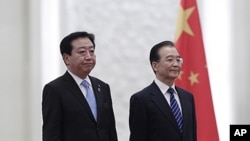The leaders of China and Japan have reaffirmed their commitment to stability on the Korean peninsula, as Japanese Prime Minister Yoshihiko Noda Monday ended a two-day visit to Beijing.
Discussions Monday between Chinese President Hu Jintao and Japanese Prime Minister Yoshihiko Noda focused on two main topics - bilateral relations and the situation on the Korean peninsula.
The official Xinhua news agency quotes Hu as saying there has been positive momentum in the past year for the development of Sino-Japanese relations. At the same time, he said China and Japan should improve political mutual trust and expand exchanges and cooperation.
The Japanese leader indicated the two sides also discussed concerns over the situation on the Korean peninsula.
He says Japan and China share a common interest in a peaceful and stable Korean peninsula.
Noda's visit comes one week after the North Korean government announced the death of the country's secretive leader Kim Jong Il. Outside observers are concerned about the transition of power in Pyongyang, saying conflict there could lead to instability in North Korea.
China is one of North Korea's closest diplomatic allies, and Tokyo is reportedly urging Beijing to share information about developments in North Korea.
Foreign Ministry spokesman Hong Lei was asked to comment on this at a regular briefing in Beijing Monday.
He gave no specifics, but said only that China is ready to work together with Japan to maintain peace on the Korean peninsula as well as the long-term security of Northeast Asia.
When asked about whether the two sides discussed territorial disputes, the Chinese spokesman said only that the two sides should “properly handle differences and problems” so as to ensure what he called “a long-term, steady and healthy development of bilateral relations.”
On the economic front, the two countries agreed to restart talks on a regional free trade pact that would include South Korea, and discussed Japanese plans to buy more Chinese government bonds. China and Japan are the world's two largest foreign reserve holders.
When asked if the latest moves mean China and Japan are losing confidence in the U.S. dollar, the Chinese spokesman said only that Beijing believes Sino-Japanese financial cooperation is a good thing.
He says greater financial cooperation between China and Japan will increase the East Asia region's ability to ward off crisis and deal with challenges, as well as maintain its own financial stability.
China, Japan Urge Stability on Korean Peninsula




